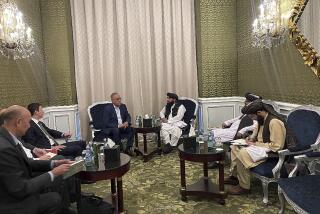Afghanistan’s Tightrope
- Share via
Confusion and political squabbling delayed the start of Afghanistan’s loya jirga, and intimidation and occasional violence marred the selection of its more than 1,500 delegates. Even so, the battered nation has shown real enthusiasm for the process of developing a representative government after more than two decades of Soviet invasion and control, civil war and rule by the Taliban.
On Monday, clumsy U.S. pressure on Afghanistan’s former king to renounce any return to power angered the onetime monarch’s supporters. In addition, warlords and local thugs have maneuvered some of their underlings into seats on the council, which will pick a government to rule until national elections in 2004. But there also are delegates determined to choose rulers who are committed to the entire country, not just personal interests.
Times staff writer Paul Watson told the story Sunday of Lawangina Rahman, a 28-year-old woman who faced down her in-laws and neighbors in remote southeastern Afghanistan to journey to Kabul as a member of the council. Rahman’s father encouraged her to seek one of the 160 appointments for women and proclaimed the family’s determination to take part in the loya jirga “even if we are killed.”
After the Taliban’s harsh repression of women, forcing them out of the workplace and schools and confining them to homes, the provision for female delegates is an encouraging sign of a new Afghanistan. So is the large number of girls entering classrooms.
Threats by some warlords or remnants of Al Qaeda to disrupt the grand council must be taken seriously, although Kabul is more peaceful than the countryside. The United States was mistaken in insisting that international peacekeepers patrol only in the capital. Failure to expand the force to other major cities such as Herat and Mazar-i-Sharif makes it more difficult to break the grip of warlords and rebuild outside the capital. Truckers shaken down for bribes or threatened with death won’t deliver food needed in rural areas.
The central government also is faced with the return of many more Afghan refugees from Pakistan and Iran than expected. Nations that together promised more than $4 billion in aid must follow through. Civil servants and security forces in the capital are barely getting paid, and the government has warned that it will depend on donors for more than 80% of its budget for next year.
Washington and its allies have promised not to turn their backs as they did after funding the war that drove out the Soviets in 1989. This time around, what they are funding is the belated creation of a stable government.
More to Read
Sign up for Essential California
The most important California stories and recommendations in your inbox every morning.
You may occasionally receive promotional content from the Los Angeles Times.













